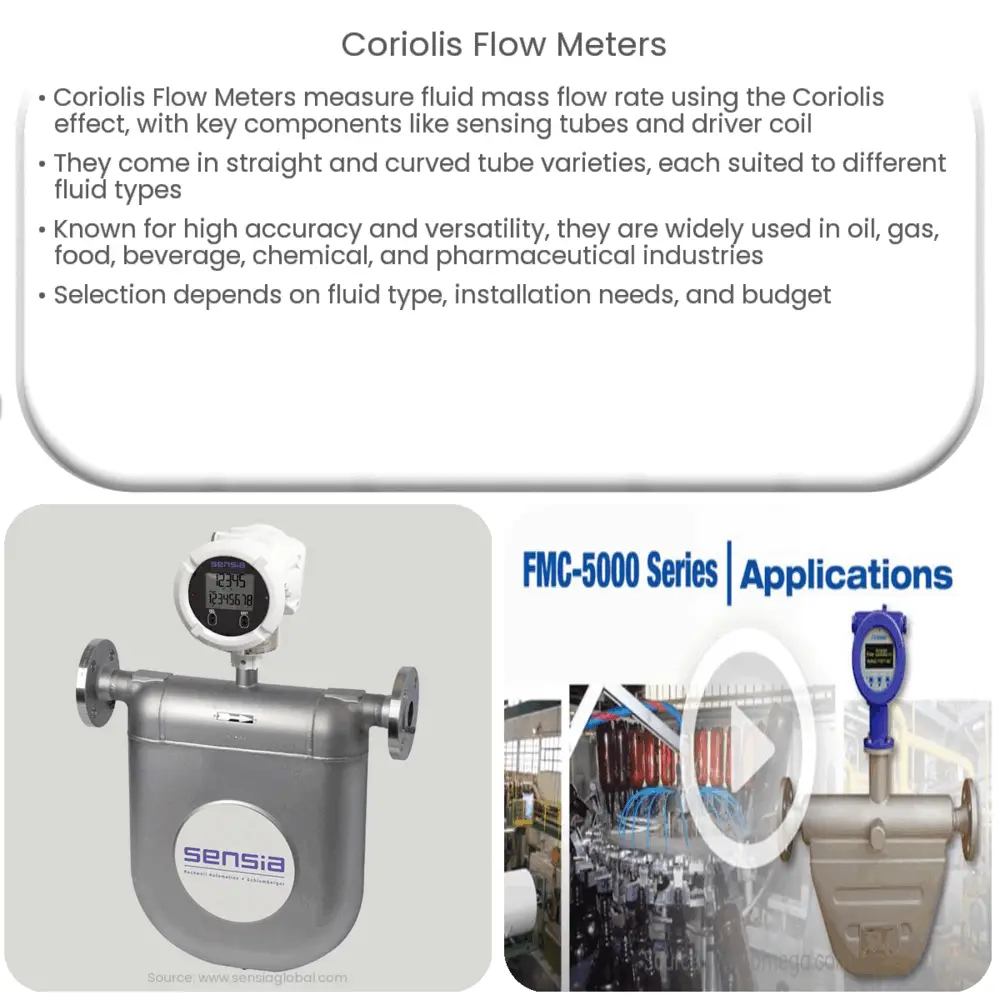Explore the workings, benefits, and applications of Coriolis Flow Meters, along with considerations for selection.

Understanding Coriolis Flow Meters
Flow measurement technology is fundamental to many sectors, including manufacturing, energy, and food processing. One such instrument in this field is the Coriolis Flow Meter. Named after Gustave-Gaspard Coriolis, a French mathematician who studied the physics of moving fluids, Coriolis Flow Meters measure the mass flow rate of a fluid.
Principle of Operation
The operating principle of Coriolis Flow Meters is based on the Coriolis effect. When a fluid passes through a vibrating tube, it induces a Coriolis force, causing the tube to twist. The degree of twist is directly proportional to the mass flow rate of the fluid. As the fluid’s velocity changes, so does the force applied to the tube. The device measures this twisting effect and calculates the mass flow.
Components of a Coriolis Flow Meter
- Sensing Tubes: These are vibrated by a driver coil. As the fluid passes through, it induces a twisting motion due to the Coriolis force.
- Driver Coil: This creates vibration in the sensing tubes. As the fluid flows through the tubes, it changes their harmonic vibration due to the Coriolis force.
- Pick-off Sensors: These detect the degree of tube twist, which is directly proportional to the mass flow rate of the fluid.
Types of Coriolis Flow Meters
There are primarily two types of Coriolis Flow Meters, straight tube, and curved tube.
- Straight Tube: As the name implies, these meters have straight sensing tubes. They are suitable for fluids with larger particulates and slurries due to their non-restrictive flow path.
- Curved Tube: These meters have curved tubes and are often used when dealing with clean liquids and gases. They are generally less expensive than their straight-tube counterparts but may face issues when dealing with fluids containing particulates.
In both types, the frequency of tube vibration and the extent of tube deflection or twist are key variables in the meter’s operation.
Benefits of Coriolis Flow Meters
Coriolis Flow Meters offer numerous advantages that make them ideal for a wide range of applications. They deliver high accuracy, can measure a variety of fluid types, and unlike other flow meters, they measure mass flow directly. This makes them a preferred choice for many industries.
Applications of Coriolis Flow Meters
Due to their exceptional characteristics, Coriolis Flow Meters are versatile and can be utilized in a wide array of applications. They are often employed in industries such as:
- Oil and Gas: Accurate measurement of petroleum products is crucial, and Coriolis Flow Meters deliver precise readings for both mass and density.
- Chemical: In chemical processing, metering the flow of various chemicals and substances is essential. Coriolis Flow Meters, due to their high accuracy and ability to handle different fluid types, serve this purpose well.
- Food and Beverage: For hygiene and accuracy in liquid foodstuff and drink production, Coriolis Flow Meters are often the instrument of choice.
- Pharmaceuticals: Coriolis Flow Meters ensure precise flow measurement, a critical factor in pharmaceutical manufacturing processes.
Considerations When Selecting a Coriolis Flow Meter
Although Coriolis Flow Meters provide an array of advantages, they may not be the best fit for every application. Factors to consider include:
- Fluid Type: While these meters handle various fluids, the characteristics of the specific fluid you’re working with could influence the selection.
- Installation: Both straight tube and curved tube designs have specific installation requirements that need to be met for optimal functionality.
- Budget: Coriolis Flow Meters can be more expensive than other types of flow meters, making budget a consideration.
Conclusion
In conclusion, the Coriolis Flow Meter is a sophisticated instrument that has revolutionized the way fluid flow is measured. Its ability to accurately measure mass flow rate regardless of the fluid’s properties gives it a unique advantage over other types of flow meters. However, it’s essential to consider the specific application, fluid type, installation requirements, and budget when choosing a Coriolis Flow Meter. As industries continue to evolve and demand more precise and efficient measurement tools, the role of Coriolis Flow Meters will undoubtedly become even more significant.

